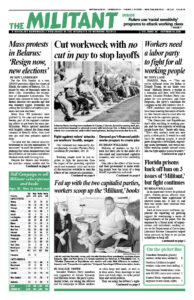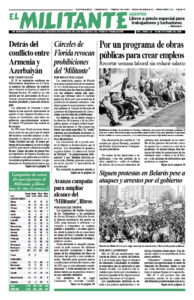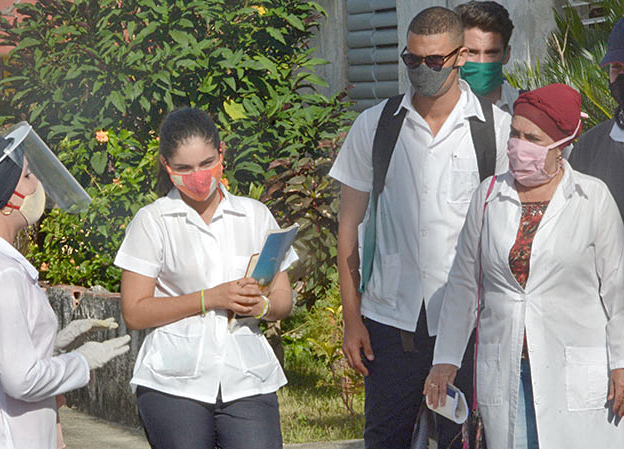At a time when the crisis provoked by the COVID-19 pandemic continues to expose the class-divided, catastrophic state of “health care” in the U.S., there is a sharp contrast in the response of revolutionary Cuba both on the island and internationally.
As of Oct. 3, Cuba had 5,718 confirmed cases and 122 deaths from COVID-19, which represents a per capita mortality of 1.08 per 100,000 inhabitants, one of the lowest in the world — 60 times lower than that of the U.S.
Cuba has implemented many of the same precautionary measures carried out around the world to minimize the spread of the virus, from wearing masks to closing restaurants. But Cuba is the only country that has mobilized its working class to protect everybody. Instead of leaving everyone to find solutions by themselves, the Cubans, in response to challenges like hurricane damage or today’s pandemic, always say, “We never leave anyone on their own.”
And no other country is capable of providing what Cuba has — truly universal health care: that is, if you’re infected you are taken care of and if you’re sick you get treated, no questions asked how you’re going to pay the bill.
The term “triage” — commonly used by medical industry bosses in the U.S. and around the capitalist world to justify leaving millions of elderly, or those less able to pay, at the back of the line for serious care — is alien to the human solidarity among working people in Cuba.
“Cuba Punches Above Weight with ‘White Coat Army’ During Pandemic” was the title of a Reuters article recognizing Cuba’s internationalist contributions. Cuban volunteer medical brigades have served in nearly 40 countries across five continents during the pandemic.
Noting that Cuba has one of the highest ratios of physicians per capita in the world, the authors say that even before the pandemic Cuba had 28,000 medical personnel providing care internationally, and an additional 4,000 have been deployed wherever asked to fight COVID-19.
These medical volunteers are a particular target of the U.S. rulers, who make it a practice of bullying any semicolonial government that dares to seek Cuba’s help.
Equally inspiring was Cuba’s response to the 2014 epidemic of the deadly Ebola virus in West Africa. Cuban internationalist doctors and nurses went to the most affected countries, and saved many lives and helped bring the disease under control. Their remarkable story is told in the book Red Zone: Cuba and the Battle Against Ebola in West Africa, by Enrique Ubieta, recently published by Pathfinder Press in English and Spanish.
A product of the revolution
What makes possible the medical and scientific achievements in Cuba, and its ability to share them with all who ask, is the economic, social and political conquests working people made by taking power out of the hands of the former capitalist rulers there and their U.S. imperialist backers.
A program on the Nova series aired by the Public Broadcasting Service in April titled “Cuba’s Cancer Hope” tells part of that story.
It’s about the development by Cuban scientists of a vaccine, CIMAvax-EGF, to treat advanced lung cancer.
Cancer is one of the main causes of death worldwide. Almost 10 million people die from the disease annually, 600,000 in the U.S. alone. And lung cancer is the principal cause of these deaths both in Cuba and the U.S.
Cuban clinical trials described in the program show that the vaccine is highly effective in treating some patients with advanced lung cancer. About 15% of patients who receive it survive for five years or more. The survival rate for patients that don’t get the vaccine is virtually zero.
The video also describes a joint effort between the Roswell Park Comprehensive Cancer Center in Buffalo, New York, one of the leading cancer institutions in the U.S., and Cuban medical institutions to learn why some patients respond well to the vaccine while others don’t. This can lead to broadening its lifesaving usefulness.
“How is it possible for a country as poor and isolated as Cuba to come up with cutting-edge medicines like this?” asks the program’s narrator. “Cuba’s unique approach to medical research stretches back 60 years, to the time of the Cuban Revolution,” he answers.
“It was not only a change of government [in 1959],” said Juan Vela Valdés, Cuba’s former minister of higher education. “It was mainly a change of economic, political and social structure of the country.”
The program shows that Cuba’s socialist revolution, and the conviction of its leadership that health care is a human right and that science should serve human needs, has a lot to do with the Cubans’ successes in medicine. This includes the development of several innovative drugs, such as CIMAvax-EGF, all of which are freely available to anyone that needs them in Cuba.
“Cuba’s Cancer Hope” shows clips of the early days of the revolution, including one of the 1960 speech by Fidel Castro known as the First Declaration of Havana, where he outlines the revolution’s program to a crowd of over a million.
Castro said the Cuban people proclaim, alongside the right of peasants to the land and workers to the fruits of their labor, “the right of the sick to medical and hospital care.” And the revolutionary government followed through on organizing workers to achieve these promises.
Cuba today has the highest number of doctors per capita in the western world, six for every 1,000 people, triple that of the U.S. And a life expectancy of 78.66 years, higher than in the U.S. and one of the highest in the world.
U.S. trade embargo
The “[U.S.] embargo will continue to be one of the biggest challenges for the Roswell Park-CIM research partnership,” says the PBS program’s narrator, showing examples of its impact on Cubans’ daily life, as well as on medical research. Washington has continued to tighten the embargo, hoping to make the lives of workers and farmers so much harder that it will compromise their support for the revolution.
The Donald Trump administration imposed another round of sanctions Sept. 23, banning U.S. citizens from staying at Cuban government-owned hotels.
The advances in health care in Cuba described in the program, and their internationalist extension worldwide, are a powerful argument for socialist revolution.
“Cuba’s Cancer Hope: Can Cuba’s Innovative Lung Cancer Vaccines Give New Hope to Patients Across the World?” can be rented on Amazon Prime for $3.99, or purchased as a DVD.


